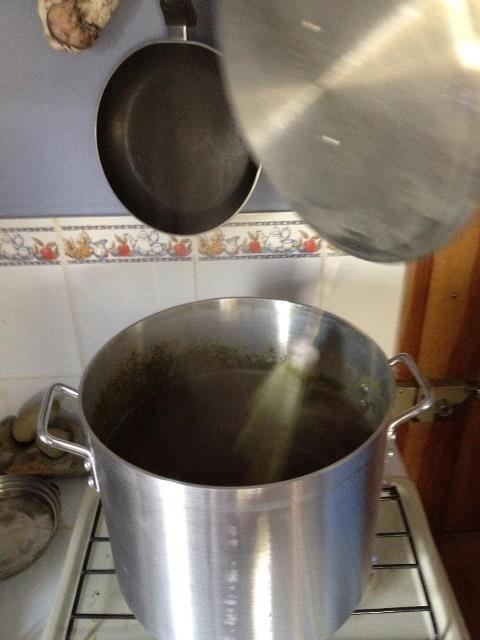hopbrad
Well-Known Member
met another guy wanting to homebrew. hoping to get enough buds together to make the dist del caribe make it worthwhile to ship in some malt extract here in homebrewless nica!!!

Yes, I'm Fernando's friend.
Well, i'd like to improve everything... I mean, when I said I've brewed a couple of batches, it's litteraly 2 batches (and one is still fermenting), jeje...
I brewed a 5 gallon batch from extract (a kit that I bought in the US), american wheat, it was quite succesfull, the beer was good. And now I'm brewing a 1 gallon all grain batch, brown ale... we'll see what happen with this... I'm also in the process of malting wheat. I've not been able to find barley, but I've seen you can get it at CENMA, as you said.
Well, that's all my experience about brewing! My main question are about the equipment you're using... mmm let's say the production process in general. The thing is that the beer I brewed was good, but the way I did it was quite messy. So I wanted advices on what is the minimum equipment that I need, etc... Also, acording to what you say, there's no way to get malted grains in Guate... Have you tried importing it by any way?
Alright, nice to meet you anyway! Maybe we could meet in person one of these days too, to taste our beers (I don't have any at the moment, so let's wait a little..)!
About my all grain small batch: I did it in a very "crafty" way. I actually didn't use a mash/lauter tun, but instead I did my mash in a pot, maintainind the tempreature on the stove. Then I just used a strainer on a pot to extract the wort and recirculate water... Unfortunately I didn't take OG readings. Then I did the boiling with hops, etc. Then put in my fermenting vessel, and pitch yeast, directly without starter.
Here comes one of my main question: how do you deal with tempreature (for fermentation)? It seems to be a bit high at my place, and the fermentation goes actually really fast: after a few hours it was already intensively bubbling, and after 2 days, no more bubbling at all (almost)... I guess I could improve it with a starter, but do you have any other advice about that?
And just another question: how do you crush your grains?
Yeah, Fer gave me you number, I'll call you one of these days, when my beer will be ready (if it's drinkable)! In which part of the city are you living?
Thanks for your inputs!
About the temperature, it's just that I read that a fast fermentation is not necesarily the best.. But anyway it works, better than no fermentation!
Given this context, how long would you consider that I should let the fermentation go (I'm planning on doing a single fermentation for this one, and then bottle conditionning... I'l try later the secon fermentation, etc.)?
Oh yeah, the handmill! I had thought about it, but I thought the crushing was going to be too thin... This mill is the kind of mill people use to crush coffee grains, and that you can find in any ferreteria, or even at the mercado, is that right?
So for the yeast, you're mostly using your own cultures?
I live downtown, zone 4
Ok, thanks for your advice Pacaya! I'll try again and hope not to be caught up by the rains for drying!

Just stopping by to let you guys know the EC-1118 champagne yeast that Curtis gave me is happily chugging away a 1.055 wort right now, it's just about done fermenting so I should have a viable colony soon, in case anyone would like some.
Hi all,
well, meanwhile I was malting some barley and wheat, and I'll soon have enough to brew some stuff with it. The process is actually pretty easy, and cheap... It just takes a little time.
Still, I have a couple more questions, pacaya: Do you have an efficient technique to get rid of the rootlets/shoots after the malting process (is it a problem if there is still some)?
About specialty grains: For darker roasted malts (e.g. chocolate) I was thinking of toasting grains in a pan on the stove, stirring them constantly... Have you tried something like that? What about cristal/caramel? did you managed to get something any close to that with homemade technique?
I learned that purging w CO2 helps prevent funk from growing on the RJ tea.
Hi guys, sorry for my late response. Thanks for the information. I´ve been a little busy with my business so haven´t had time to do anything regarding beer!!! Haven´t done anything in this 2013!!! because of my work!!! So I´ve set my goal to start again this month and not to stop at least for the months we have left for the 2013.
...I want to buy the barley and do the malting and for the roasting I have a couple of friends that are in the coffee business and they own industrial ovens were they roast coffee grains, I think this can help me achive the different kinds or specialities that I have read...I will try some and if you want, I can give some to whoever wants and would like to give it a try and lets know if it worked!!! I haven´t done all grain brewing but I would like to start with it once I finished with the experiment of the barley...
Please let me know your comments or suggestions!!!!
But I must say that when I poured the wort in my fermenter, the sruff had a strange aspect (colour and smell), although I never brewed a wheat beer so I had no reference...
Enter your email address to join: